VOL- 6 ; ISSUE- 4, PUNE RESEARCH - An International Journal in English (ISSN 2454-3454) JIF 3.02
6.4 ENGLISH
Area of Article : ALL
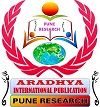
VOL- 6 ; ISSUE- 4, PUNE RESEARCH - An International Journal in English (ISSN 2454-3454) JIF 3.02
6.4 ENGLISH

VOL- 6 ; ISSUE- 4, PUNE RESEARCH - An International Journal in English (ISSN 2454-3454) JIF 3.02
6.4.1 ENGLISH
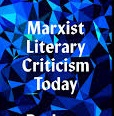
The origin of the sociological approach to
literature dates back to the early Greek thinkers. Sociological Criticism
starts with the simple conviction that relations of arts to society are vitally
important and that the investigation of these relationship may organize and
deepen one’s aesthetic response to a work of art. Art is not created in a
vacuum, it is a social product and hence a proper understanding of any art
including literature is bound up with a study of the particular social system
that has given shape to it. The
Sociological Critic is primarily interested in exploring the social
milieu and the extent and the manner in which the artist responds to it.
Although the sociological approach to literature has been widely used by
critics in the earlier years, it was with the spreading of the ideas of ‘Karl Marx’ that this approach
become a scientific method of literary interpretation.
VOL- 6 ; ISSUE- 4, PUNE RESEARCH - An International Journal in English (ISSN 2454-3454) JIF 3.02
6.4.2 ENGLISH
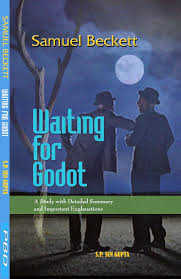
This paper is an attempt to depict the demolition
of nature due to the Second World War. Nature takes an integral part in the
lives of people. The paper, by using the drama waiting for Godot by Samuel
Beckett, illustrator how the unavoidable relationship between man nature are
fragmental during the Modern Era. In this paper I have tried to show Beckett’s
duality in representing nature through Vladimir and Estragon; Firstly, it
reveals the exploitation of nature, and secondly, it precariously exposes the
disintegration of modern society.
Keywords : Vladimir,
Estragon, Exploitation, Disintigration.
VOL- 6 ; ISSUE- 4, PUNE RESEARCH - An International Journal in English (ISSN 2454-3454) JIF 3.02
6.4.3 ENGLISH
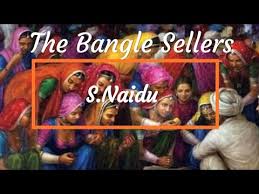
The human journey is full of different colors
that influence its physical, and psychological state. India has consistently
been dignified and remembered affectionately as the country of symbolic colors.
Color, in essence, has largely been a part of the Indian consciousness. Colors in India are associated with different religions, dialects,
customs, conventions and worldliness. They play a significant role
in the way Indians perceive and interact with others. Variety of colors are
incorporated into festivals and ceremonies of India which makes it a land of
vibrant colors, thereby underlining the concept of “Unity in diversity”. As an enormous and diverse country, India serves as the home to myriad
interpretations and representations of Symbols and Colors. However, in particular colours are an
inseparable part of women’s life specifically as they are a feeling of womanhood that beguile their life
in a mysterious way and are indivisible. The poem taken for study i.e. “The
Bangle Sellers” portrays the origination of Indian ladies in a customary social
set up. Three phases of an incredible progressions are given reference to the
shades of her bangles. Each of these shades are firmly related to the delights
and distresses of every one of these stages. This study will concentrate on the essentialness just as the key
relationship of women and colors. The study will
likewise focus on the poem in the light of modernism. As today no specific
shade of bangle is bound to be wore among a confined age group of women. As of
now the contemporary time centers around the opportunity of women so it is
progressively significant for them to feel free and live with colors that
satisfies their spirit irrespective of their age group.
VOL- 6 ; ISSUE- 4, PUNE RESEARCH - An International Journal in English (ISSN 2454-3454) JIF 3.02
6.4.4 ENGLISH

Listening is a significant skill which has to
be developed for learning any language. Even though the other skills such as
reading, speaking and writing are also essential to develop language
proficiency, listening contributes primarily for language expertise. Since
listening is the gateway for any learning. That is why, the skill of listening
has taken the first position. Despite its importance, language learners
consider listening as the most difficult skill to acquire and hence often
overlooked both in importance and practice. Of course, the listening skill
varies from person to person. We can find some passionate listeners, while
others are not. The span of attention
also does vary. The listening comprehension plays a major role in language
teaching and has been repeatedly emphasized. Yet many teachers do not pay
enough attention to its importance in their classes. In this paper, we are to
review some important issues concerned with listening skill and to discuss
various factors which provide a basis for developing listening skill. It starts
with a definition of listening, the need for enhancing the skill, tips to be a
good listener and various obstacles which mar one’s attention and ways to
improve Listening skill.
VOL- 6 ; ISSUE- 4, PUNE RESEARCH - An International Journal in English (ISSN 2454-3454) JIF 3.02
6.4.5 ENGLISH

Computer Assisted Language Learning (CALL) in
current scenario is drawing a lot of learners’ attention in learning and
gaining knowledge of multiple tools available in the computer. Nowadays,
computer literacy is becoming more important. Computer Technology improvises Teaching
- learning simulation interestingly in which the learner as well as the teacher
can witness the ‘reality’ of the work. The modern technology like Information
and Communication Technology (ICT) been using to guide language learning and
teaching in mixed ability of large groups. Interactive and very useful tools
likes Google Classroom, Moodle (Gnomio) etc., make students to work in groups,
physically active and collaboratively. Role Play, Mind Mapping, Brainstorming,
Story Telling etc., allows each student to speak and expose their creativity in
a safe zone which develops their soft skills too. Thus, CALL and ICT and its
principles certainly enhance language teachers’ to design the course, plan the
team activities etc., at this pandemic situation in order to develop language
skills among the learners’ with varieties of methods, approaches and techniques
with interactiveness. Individuals are motivated to learn in order to develop
them physically and psychologically and to satisfy the need of an hour.
Keywords:
Computer Assisted Language Learning (CALL), Information and Communication
Technology (ICT), Google Classroom, Moodle (Gnomio), collaborative learning.
VOL- 6 ; ISSUE- 4, PUNE RESEARCH - An International Journal in English (ISSN 2454-3454) JIF 3.02
6.4.6 ENGLISH
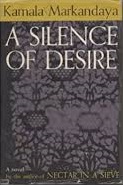
An interesting aspect of the modern Indian
enlightenment has been the creative release of the feminine sensibility. Women
in modern India have not only shared the exciting and dangerous burdens of the
struggle for independence but also articulated the national impulse and the
consciousness of cultural change in the realm of letters. In the personality of
an individual like Sarojini Naidu, the temper of Indian womanhood achieved its
comprehensive synthesis; she was not only the lark of the Indian political
awakening but also the nightingale of the Indian imagination. If a plunge of
the Indian womanhood into politics had been almost a common occurrence in the
days of the freedom struggle, the literary enterprise too, held out its
fascinating, if not always rewarding, attractions; in the development of the
Indo-Anglican novel, the feminine sensibility has achieved an imaginative
self-sufficiency which merits recognition in spite of its relatively later
manifestation. Thus, Markandaya’s literary sensibility projects
itself in her novels as an acute, if unsolved, perception of the different and
distinct forms of national consciousness, which propel the individual’s
progress in the modern world. It is possible to trace out in her novels an
intelligible pattern of ideas, that reveals her aesthetic assimilation of a
long-established tradition under the disturbing impact of modern, “spiritual,
or more strictly, religious” as embodied in A Silence of Desire
Keynotes:- Self-assertions, self identity,
socio economic oppression
VOL- 6 ; ISSUE- 4, PUNE RESEARCH - An International Journal in English (ISSN 2454-3454) JIF 3.02
6.4.7 ENGLISH
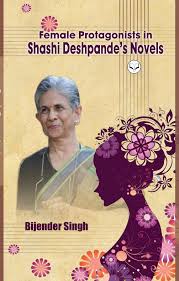
Shashi
Deshpande is undoubtedly an outstanding Indian English novelist. She occupies a significant place among the
contemporary women novelists who concern themselves with the problems of women.
Her work reflects the whole gamut of Indian cultural issues, the thickly
populated world of her novels, the
working out of relationship within families and marriages, the fine insight
into human character as well as her
boldness in the treatment of sex and class barriers which have been the major
concern of her fiction. Her work provides a pointer to the catatonic status of
woman in the tradition bound, male dominated middle class society of
contemporary India, the present paper is an attempt to analyze her protagonist
in a brief way.
VOL- 6 ; ISSUE- 4, PUNE RESEARCH - An International Journal in English (ISSN 2454-3454) JIF 3.02
6.4.8 ENGLISH
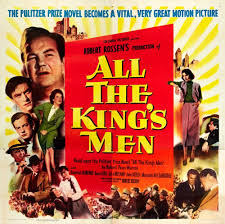
As
an intellectual achiever and an American genius. Robert Penn Warren had
established himself as an prolific writer with a significant contribution to
American literature by publishing a major work almost every year and jointly
authoring a good number of books.
Hailing from Kentucky in the Southern region of America, he had a bright
university career and joining the “Fugitive” group, he participated in all
types of intellectual discussions and got well-versed in every genre. His
growth as a literary artist and his literary stances won him the Belington
Prize and the Pulitzer Prize. His early literary works were found to be rather
derivative but his later literary creations did bear the distinctive and
individual stamp of the author.
VOL- 6 ; ISSUE- 4, PUNE RESEARCH - An International Journal in English (ISSN 2454-3454) JIF 3.02
6.4.9 ENGLISH
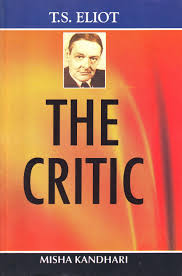
T.
S. Eliot may best be called a literary crusader. The impact of the various
theories he has expounded in poetry, drama and criticism has been remarkable.
Numerous monographs, critiques and profiles published on Eliot during the last
four decades speak amply of his legendary reputation. Eliot’s interest in and
preoccupation with socio-literary activities was as much the result of his
birth and breeding as of the intellectual climate of the times in which he grew
and matured. His work and personality as a whole have their full meaning only
in the larger context of the cultural traditions of Europe. Eliot is both Westerner and New
Englander. In fact, to follow the growth of the literary artist in Eliot is to
follow the core of Western as well as Eastern cultures. As D.E.Jones puts it,
“one trying to understand Eliot may find oneself reading anybody from
Heraclitus to Bradley in the realm of philosophy or from Aeschylus to Anouilh
in the realm of drama”.
VOL- 6 ; ISSUE- 4, PUNE RESEARCH - An International Journal in English (ISSN 2454-3454) JIF 3.02
6.4.10 ENGLISH

This
research article at the outset written with an aim to explore the essential
techniques, skills and elements of communication process. This article further
proceeds with the steps that is used to tackle the barriers of effective
communication. And it insists the point that the process of communication is a
significant thing in one's life. And this research article ends up with the
fact that a person with good communication skills becomes a leading personality
both academically and professionally in his life.
Keywords:skills, communication, effective, process,
elements, sender, receiver,
message, decode, encode.
VOL- 6 ; ISSUE- 4, PUNE RESEARCH - An International Journal in English (ISSN 2454-3454) JIF 3.02
6.4.11 ENGLISH

Sylvia
Plath with her various experiences as a poet, a feminist and a deeply suffering
self, has a wider range of knowledge which has helped her to explore life from
different angles. But her poetry resists any sort of ratiocination preferring
to be elusive. The key to her poetry is the charge that Plath says too much at
the same time. She is more than one person, a split personality. What holds her together is the synthesis of
her multiple experiences is her poetry and ambiguity is the essence of her
style. Being a very conscious poet, Plath wrote with careful consideration. She
is an insatiable artist, ambitious to master all the forms of poetry adhering
strictly to the rules but soon finds her way out through a process of
self-questioning.
VOL- 6 ; ISSUE- 4, PUNE RESEARCH - An International Journal in English (ISSN 2454-3454) JIF 3.02
6.4.12 ENGLISH

This
paper is an attempt to present George Orwell’s novels as the perfect revelation
of his idealistic and romantic notions of political expediency. Analyzing his
novels, this paper presents how he designed his characters and plot in a way to
criticize and mock his contemporary political affairs. His structuring of
stories and the reasons for his story lines were justified in this paper by
analyzing his mentality and courageous presentation. Thus, this paper glorifies
Orwell for his courage, individuality and timely criticisms.
Key Words: Individuality,
social consciousness, political problems, socialism, criticism.
VOL- 6 ; ISSUE- 4, PUNE RESEARCH - An International Journal in English (ISSN 2454-3454) JIF 3.02
6.4.13 ENGLISH

The
Oxford English Dictionary defines tragedy as “a play or other literary work of
a serious or sorrowful character, with a fatal or disastrous conclusion”. In ancient Greece, it was used with reference
to lyric songs and later to dramatic pieces meaning “That branch of dramatic
art which treats of sorrowful or terrible events in a serious and dignified
style opposed to comedy”. According to
Aristotle, tragedy is to depict the fall of a great person from a high position
and the fall to be brought about by ‘hamartia’ or ‘tragic flaw’. With the many upheavals and drastic changes,
it appeared that tragedy had disappeared in the twentieth century. Joseph Wood Krutch in his “The Tragic
Fallacy” points out that tragedy is not an expression of despair but the means
by which the people of the great ages saved themselves from depression.
VOL- 6 ; ISSUE- 4, PUNE RESEARCH - An International Journal in English (ISSN 2454-3454) JIF 3.02
6.4.14 ENGLISH
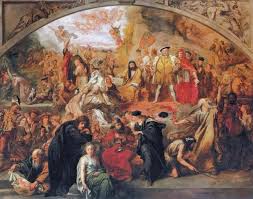
‘Problem
Play’ is a form of drama that emerged during the 19th century as
part of the wider movement of realism. A very characteristic feature of the
problem play is that it deals with problematic social issues through debates
between the characters on stage, who typically represent conflicting points of
view within a realistic social context. Far from being plays with fatal flaws,
as one might imagine from the name, problem plays are actually plays which are
designed to confront viewers with modern social problems. Typically the theme
of the play is socially relevant, and the characters confront the issue in a
variety of ways, presenting viewers with different approaches and opinions.
After seeing a problem play, one is supposed to be filled with interest in the
topic at hand and hopefully inspired to enact social change.
VOL- 6 ; ISSUE- 4, PUNE RESEARCH - An International Journal in English (ISSN 2454-3454) JIF 3.02
6.4.15 ENGLISH
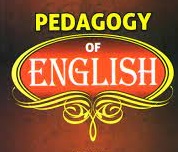
The present paper has tried to unfold the common but serious problems
that one faces as ateacher-learner and student of English language. The article
highlights the issues and also puts forth suggestions that may make Learning,
Reading, Writing and Speaking English easy and beneficial for the academic and
economic growth of the students.
Keywords: Pedagogy, FirstLanguage, Second Language,
Learner, Teacher,Performance, Competence.